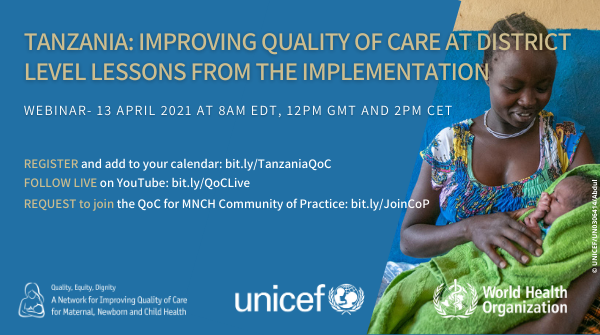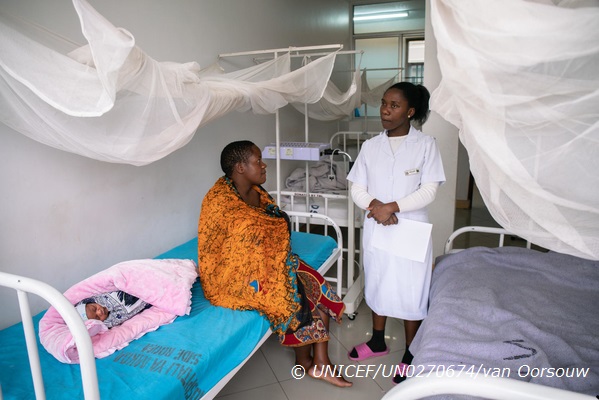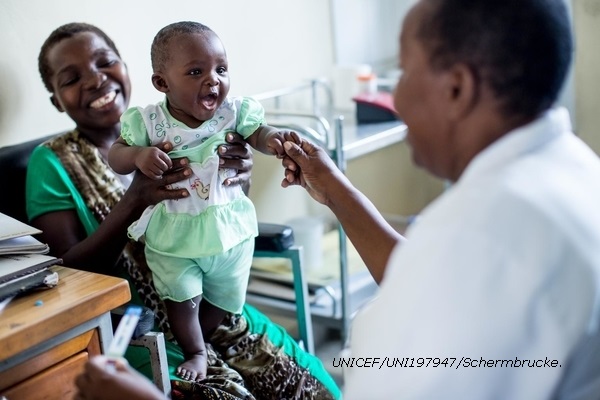Quality of care in Tanzania
The National Health and Social Welfare Quality Improvement Strategic Plan and a Quality Improvement Framework in Health Care (2016-2020) defined the work for quality health care in Tanzania. During 2021, the Ministry of Health and Social Welfare conducted national stakeholder consultations to inform the drafting of Zanzibar’s first Health Quality Strategic Plan (2020/2021–2024/2025) and Tanzania Quality Improvement Strategy Framework in Health Care (TQISF) (2021-2026) in Mainland Tanzania.
For reproductive, maternal, newborn, child and adolescent health (RMNCAH), National harmonized RMNCAH, including small and sick newborn quality care standards were finalized in 2021. In the final quarter of 2021, Tanzania finalized the adoption, validation, dissemination, and distribution of standards for quality maternal, newborn and child health and is in the process of adapting the WHO standards for care of small and sick newborns in health facilities and WHO’s pediatric standards in 2022. In addition, implementation guidelines for maternal, newborn, child and adolescent health standards, including guidelines for small and sick newborn care, and standard guidelines for children and adolescents are planned to be developed and disseminated in 2022. The Ministry of Health and Social Welfare plans to develop and disseminate guidelines for antenatal care (ANC), Postnatal Care (PNC) and Emergency Obstetric and Newborn Care (EmONC) in 2022.
Quality improvement (QI) teams have been capacitated over recent years to implement quality care, with ongoing capacity building on QI at sub-national level and supportive supervision in 34 health facilities across both Mainland and Zanzibar. These facilities across 7 regions were selected as learning districts due to the high volume of deliveries, maternal and perinatal deaths, and poor RMNCAH indicators, yet motivated staff. In 2022, an assessment of quality of care service delivery is being conducted in Mnazi, Mmoja, and Zanzibar main hospitals and in additional 5 districts to identify changes and progress.
As part of ongoing efforts to improve quality of care and address the underlying causes of maternal and perinatal death, Maternal and Perinatal Death Surveillance and Response (MPSDR) has been institutionalized at all learning districts. MPDSR committees across 8 Learning districts and a national MPDSR committee convenes regularly to discuss causes and response needs, and challenges faced in the implementation of MPDSR activities. In 2021, a third national MPDSR report was launched which documents that most maternal deaths occur at the community level, and post-partum haemorrhage, eclampsia, and shock are the leading causes of maternal deaths in Tanzania. Efforts have been made to increase community engagement and participation in several Learning Districts. In Zanzibar, Facility Health Committees have been operational to solicit and address feedback derived through community social dialogues and this mechanism is being scaled up further. In 2021, Information, Education, and Communication materials for Community Health Volunteers were developed and disseminated to support health promotion and to support community identification of emergency referral cases. In 2022, comprehensive training of 780 Community Health Volunteers (CHVs) on MNCH services and QI interventions was conducted.
As part of efforts to engage the private sector in improving maternal and newborn health quality of care and QI implementation, the Ministry of Health and Social Welfare’s Private Hospital Advisory Board supported the assessment of 50 private facilities in Zanzibar in 2022. An additional 50 private facilities health care providers were supported to undertake self-assessment using electronic devices.
Research on packages for survival at birth across learning districts was initiated in 2021. Research specific for quality of care was initiated with the establishment of an institutional-level agreement between UNICEF and Muhimbili University of Health and Allied Sciences (MUHAS) in 2021.
Onsite coaching and supportive supervision of District Health Management Teams, Community Health Volunteers and Shehas (who are the leaders of “shehias” which means villages in the community structure for Zanzibar) was conducted in 2022 to ensure the sustainability and scalability of QoC interventions. To ensure data is being collected and reported on regularly, routine quarterly health management information system (HMIS) platforms meetings are planned and as well as plans to strengthen the use of software to collect data on common core indicators for quality of care. In addition, the documentation of Quality Improvement activities and best practices at facility, learning districts and national level is planned to be prioritized.
Photo: Gift Moses (not in picture) holds her newborn baby girl in the Mbeya Regional Hospital in Mbeya, Tanzania. © UNICEF/Holt





